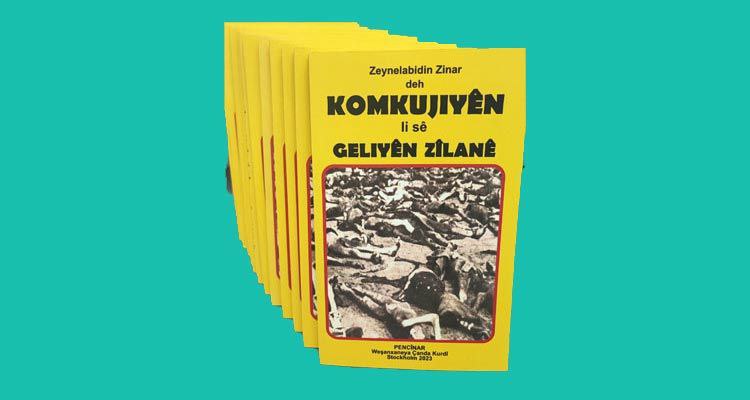Read part one of this article here
The Agri Revolution, the First Hero of the Uprising
For the Kurds of the Northern part of Kurdistan, the desire for freedom continued through the war, with agitation and ceremonial activities and with the hope for days of freedom to come. The revolution began against the slaveholders at the request of an independent country with a patriotic sense in the Agri region under the leadership of the Kurdish hero, Broye Haske Teli (1885_ 1931).
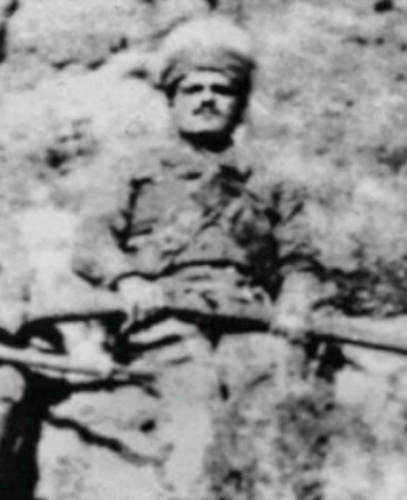
Broye Haske Teli
Time, days, and years have their special place in history. The early days of 1926 were the beginning of a new era for Kurds. The Agri revolution was expanding more and more. The Kurds were happy and proud. In Amad, Van, Zakho, Urmia, Qamishlo, and in many other regions in Kurdistan the warriors and brave Kurdish men were riding their horses towards Agri Mountain.
Men like "Ehsan Nouri Pasha", "Farzanda Bagi Hassani", "Sloye Rasho", "Khals Bag", and "Kor Hussein Pasha" armed themselves with various weapons and went to help Broye Haske Teli.
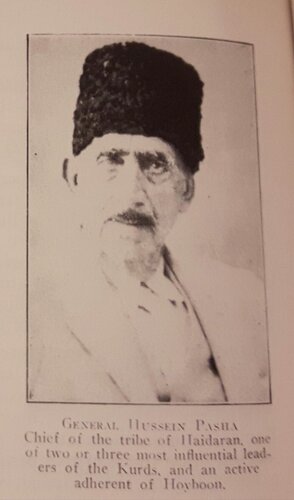
Kor Hussein Pasha
Until that day, Agri Mountain had not seen such brave men nor such happy days. A republic system called the "Kurdish Republic of Agri" was established there. The green, red, and yellow flag of the republic was waving in the wind bringing freedom to people. The warriors of freedom were liberating Kurdistan villages and towns from slavery.
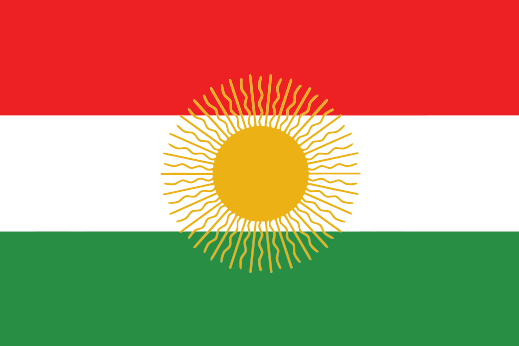
Kurdistan Flag
A strong and beautiful fire was burning in Agri Mountain that could not get extinguished easily. A warm and hopeful situation was going on that had made every patriotic Kurdish individual happy. It also burned the enemies' hearts. Thus, the slavery chains that were tying the Kurdish people's necks got cut.
Since the Turkish Republic remained confused and surprised were occupied with meetings and discussions on how to destroy the Agri revolution. They were looking for a solution but were unable to find one.
It did not seem normal to keep the Kurds fighting so they decided to deceive the Kurds! Once again, the Turkish state planned to mislead Kurds. Kurds' slogan was unity, freedom, and again unity…
Kurds knew very well that if they were not united, all of them would die thus they formed their unity. The second plan of the Turkish state found a loophole.
Turkish state began their meeting for their third plan. The result of those meetings was:
-Iran and the Soviet Union must close their borders to the Kurds so that they would not have any other way except Agri Mountain.
-We need Britain's help. We need air forces. We should only keep Mosul city for them.
-We must threaten the Kurdish villages not to support the Agri Revolution.
As the Turkish state was making these decisions, the Kurds met and made different decisions. The Kurds knew very well that Iran and Soviet Union borders would be closed for them. They knew the revolution would end. They also knew that if they were besieged, mass killings would happen in the Kurdish regions. Unfortunately, the situation got worse and worse. If the Kurds of the other regions did not start fighting, all the army forces of the Turkish state would attack Agri. Farznda Bag and his friends were responsible for making the Kurds aware of the situation.
The Haydaran, Kalkan, Bakran, and Adaman clans began a new battlefield in Zilan. The battle grew larger every day. The Kurdish forces began their attacks in Zilan Valley. Ehsan Nouri Pasha, however, was not aware of those attacks in Zilan due to a lack of proper connection between Agri and Zilan.
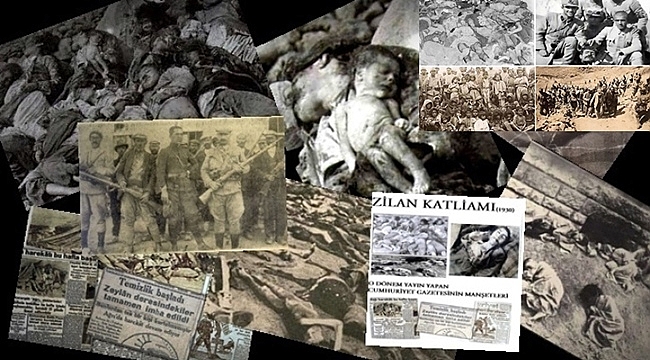
The Kurdish attacks in Zilan Valley frightened the Turkish Republic and they began to retract their forces gradually. They returned to the area after some time. They returned with tanks, cannons, bombs, and aircraft, and … they attacked Zilan valley like wolves. The British air force bombarded 200 Kurdish villages with 80 aircraft. After a short while, the Zilan region was destroyed and everything was burned to the ground.
This time, the Turkish Republic's plan was successful, and the innocent Kurds most of whom were women and children were killed. The extermination did not satisfy them so they asked for Iran's help. They told Iran: "Close your borders, close your gates so that they would not reach their Kurdish allies in Iran."
Iran obeyed the Turkish Republic's request and arrested "Uosb Avdal". Uosb Avdal's task was to make connections between the North and East parts of Kurdistan. When the Kurds faced these conflicts, they would flee to Iran with Uosb's help. Now, Uosb was arrested too and there was no one else to help them. The situation was very bad. Genocide was carried out; the Kurdish massacre was continuing. Zilan Valley was full of Kurdish corpses.
On July 13, 1930, a Turkish newspaper wrote: "Our state suppressed the Kurdish revolutionaries within five days. Zilan Valley was set to its right situation. Our forces killed those rebels who went to the mountains and hid their corpse out of sight in Zilan." Yes, the word "hide out of sight" is a familiar term in Muslim culture and it is used for animals' dead bodies.
The region between Zilan Valley and Sipan Mountain was bombarded without stopping. The Kurdish people of this area went to Agri. Not only the warriors but their families also went to Agri. The number of residents was increasing and since all the paths were blocked, their stored goods were not enough for them. Although the Turkish Republic stopped their movements, they had surrounded the mountains where the uprising was going on. There was only one way for Kurds to save themselves and it was going to the East part of Kurdistan. This way was also blocked by Iran. Thus, the Kurdish forces had to fight the Iranian guards to find a way to escape and they reached the Kurdish villages. After their settlement in the villages, Iran attacked the Kurdish regions and villages. The revolutionary forces did not have any other way except to go back to the northern part of Kurdistan and they settled in Van region villages. However, Ehsan Nouri Pasha, Ayub Agha, Broye Haske's brother, and some other people surrendered themselves to Iranian forces.
When most of the commanders of the Agri revolution left, Broye Haske Teli did not leave and continued his revolution till he died. In addition to him, other men like Rasho Silo, Sheikh Zaher, and Sayyed Khan Alijan Bag resisted for almost two years but finally, they got arrested and some of them got killed. In 1932, the war ended and the Turkish state exiled many. In fact, Kemalism did not need any laws, but this order was known as a law. Due to this order, most of the famous Kurdish families were displaced in other Turkish cities.
To be continued…

